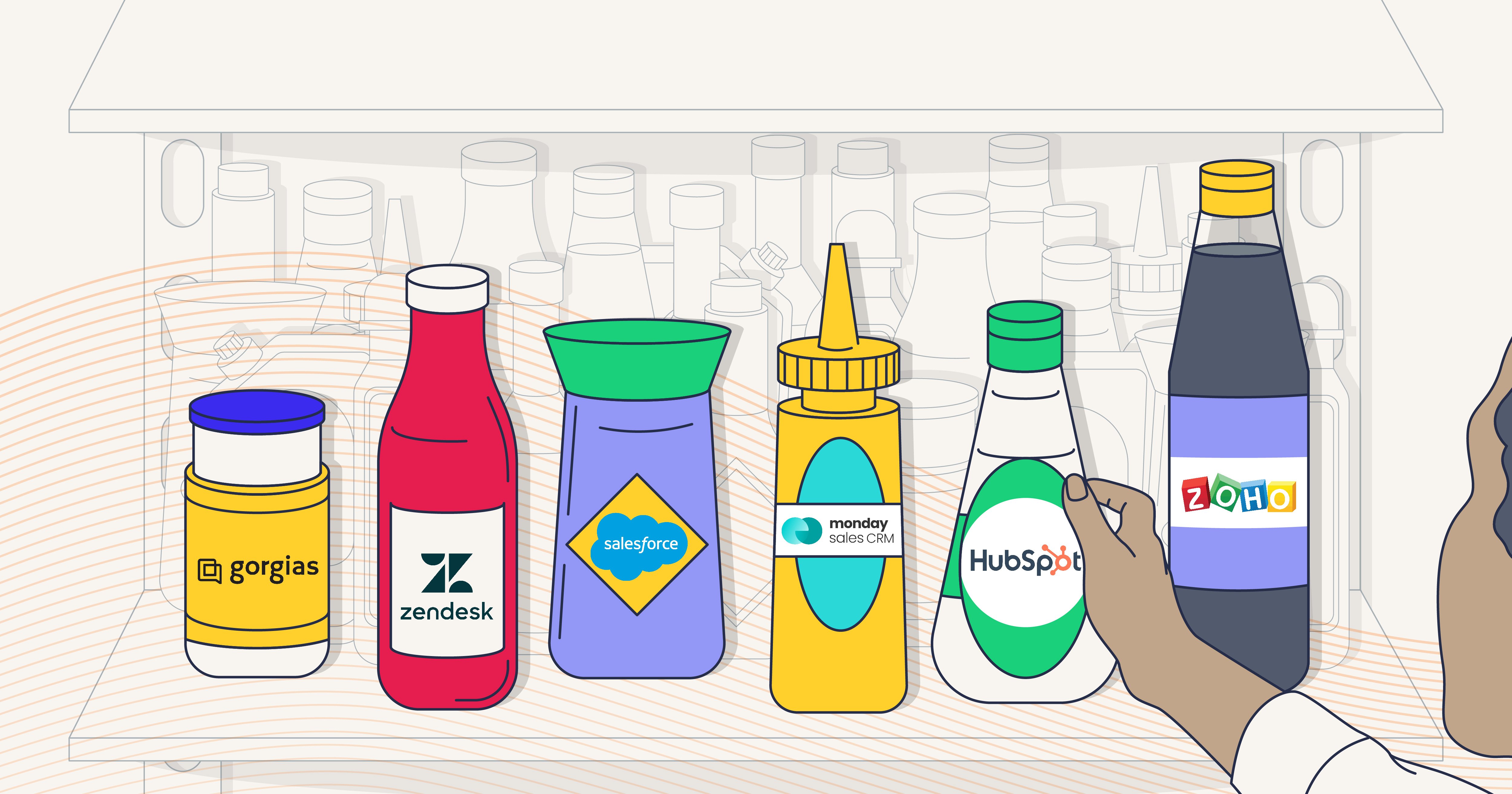Customer Relationship Management (CRM) is the heartbeat of modern businesses, especially growing e-commerce or SaaS companies because it is pivotal in elevating the overall customer experience (CX) of most business ventures.
But what exactly is a CRM? Simply put, CRM is a software system designed to streamline interactions with customers, prospects, and leads by consolidating all communications, from emails to survey form fills. The term CRM has recently become interchangeable with CXM (Customer Experience Management), which refers to software tools that not only gather data but rather track the entire customer journey, thereby providing deeper insights into each customer’s experience and preferences. When used correctly, CRMs or CXMs can replace traditional apps, spreadsheets, and databases used to compile customer data, while improving operational efficiency and data accuracy.
The result is a real-time, centralized database of client data that can empower businesses to seamlessly nurture current relationships and foster new ones, naturally driving sales and cultivating success for the long term. It also enables support teams to pivot faster where trends become apparent. This process can be further enhanced or augmented by integrating AI into CX workflows.
But what can a CRM or CXM do that a spreadsheet can't do?
Spreadsheets are a helpful starting point for businesses with minimal contacts or for tracking static info like names, emails, or phone numbers. CRMs and CXMs, on the other hand, can track more dynamic (or frequently updated) data, such as a customer's previous purchase or the date of their last visit to the company website. CRM databases are often updated in real-time, while spreadsheets require manual updating.
Evaluating your business needs
The available CRM software platforms are as varied and diverse as the businesses that use them. Evaluating and understanding your business needs will help align your requirements with the appropriate CRM tools and make your choice of software synergize more effortlessly with your workflow.
Determine the size and scale of your business
For start-ups and small businesses, priorities are often on simplicity and cost-effectiveness since smaller businesses work with a smaller contact list. CRMs designed for smaller companies will prioritize user-friendly interfaces and have streamlined functionalities, which can help manage customer relationships without the burden of overwhelming complexity.
For medium-sized enterprises, a balance between advanced features and scalability would be the most advantageous. Medium-sized businesses are poised to scale, so look out for CRMs that offer a range of functionalities that can adapt as the company grows and expands.
For large corporations, managing extensive data and complex processes requires a robust CRM or CXM solution. Corporations will need features such as advanced analytics, customization options, and enterprise-grade capabilities that can handle the intricate demands of a large-scale operation.
Identify industry-specific needs
Beyond size and scale, companies should take note of industry-specific needs. Consider how an e-commerce business like an online clothing store might require different CXM functionalities than a service-based business like a cleaning company.
In the e-commerce sector, customer loyalty and inventory management are essential. A CRM tailored for e-comm or retail would help track customer preferences, manage inventory efficiently, and enhance the shopping experience with customizable content options.
On the other hand, for service-oriented businesses, especially SaaS or software companies, the focus would be on efficient service ticketing systems and client communications. A CRM aligned with those needs would have robust communication tools and service-tracking capabilities that could foster positive long-term client relationships.
Understanding industry-specific needs will be instrumental in harnessing the full potential of a CRM and ensuring that it not only adapts to size and scale but also becomes an asset in driving success in your chosen sector.
Determine your business goals and objectives
Business goals are the compass of any support team, including the choice of CRM software. If your business goal is to boost customer retention by 20% within the following year, your CRM choice would center around features such as:
- advanced analytics to identify customer behavior patterns,
- personalized communication tools to nurture new and existing relationships,
- and automation capabilities to implement targeted retention campaigns.
A clear vision of your business goals should transform the CRM from a mere tool to a strategic CX partner, whether your aim is revenue growth, operational efficiency, or customer satisfaction (CSAT).
Top CRMs in the Market
Having pinpointed business needs based on size, industry, scalability, and business goals, you can now identify the CRM tools that align best with your business requirements. Here's a look at some of the prominent CRM software:
Salesforce
Salesforce is one of the most popular CRM software providers thanks to its wide range of customization options. While the platform has an exhaustive list of features, the software is more renowned for its versatility and adaptability, making it great for businesses of all sizes. Small businesses can benefit from its user-friendly interface, while its functionality can cater to the demands of larger corporations. Salesforce is great at nurturing customer relationships, managing sales processes, and supporting general marketing efforts.
Key features:
- User-friendly interface and customizable dashboard
- Advanced analytics and AI-powered insights
- Many third-party integrations
Hubspot
HubSpot is another popular choice, standing out for its ease of use. While its scalability options can accommodate the expanding needs of medium-sized enterprises, the simple interface and seamless integration with other HubSpot tools make it an attractive choice for start-ups and small businesses.
Though larger corporations may need more advanced features, HubSpot's emphasis on inbound marketing, sales, and customer service also positions it as an effective solution for any business that aims to attract and engage customers organically.
Key features:
- Streamlined lead generation and management
- Email marketing automation
- Contact and communication tracking
monday Sales CRM
monday Sales CRM is a visually intuitive platform that integrates with the monday.com work operating system, making it a cohesive platform for businesses integrating both sales and project management. The emphasis on visual organization makes it an excellent tool for companies with less complex sales processes, which makes sales tracking more intuitive. While monday is known as a project management tool, its CRM platform makes the most of the integrated project management features with its collaborative functionality, seamlessly combining sales and project management aspects within the monday.com ecosystem.
Key features:
- Visual interface for intuitive sales management
- Lead and deal-tracking capabilities
- Work management platform
- Collaboration tools within the monday.com work operating system
Zendesk
Zendesk is a comprehensive customer service and engagement platform perfect for e-commerce companies with a strong focus on Customer Experience. The software offers a user-friendly interface and a multitude of features tailored for efficient customer support, allowing businesses to effortlessly manage customer interactions, track support tickets, and optimize the entire support chain for enhanced customer satisfaction. Zendesk also has pre-built integrations to popular e-commerce platforms like Shopify and Magento, making the platform a centralized hub for streamlining processes, promptly resolving issues, and crafting a positive customer journey from inquiry to resolution.
Key features:
- User-friendly interface for e-commerce customer support
- Features geared towards optimizing support chains
- Integration capabilities with popular e-commerce platforms
- Scalability to accommodate businesses at different stages of growth
Gorgias
Similar to Zendesk, Gorgias is an advanced customer support helpdesk platform designed specifically for e-commerce companies. The software integrates seamlessly with Shopify and other platforms, going beyond traditional customer support by offering e-commerce merchants a comprehensive solution for managing order-related inquiries, returns, and shipping tracking.
Gorgias also emphasizes its automation features, which are useful to businesses that want to increase response times or resolve tickets quickly. Unlike other CRMs which will have a wide array of features or integrations to suit various industries, Gorgias is tailor-made for e-commerce merchants, with every feature on the platform's product roadmap built to increase sales and optimize customer support and experience.
Key features:
- Exclusively built for e-commerce
- Automation capabilities for quick response times
- Streamlined order tracking and management
Making the Decision
CRM or CXM software can take your customer support team to the next level, optimizing team performance, boosting sales, and improving CSAT. While a vast array of options makes navigating customer management software a daunting task, taking the time to understand your business needs clarifies which CRM aligns best with your processes and requirements.
As an ethical outsourcing company, we have helped our e-commerce and SaaS clients to leverage CRM software to achieve their CX goals, or to transition from one CRM platform to another during seasonal peaks or following a period of rapid growth. No matter your company size, scale, or industry, we can help you build a global CX team around your preferred customer experience management software. For more information, reach out to us for a consultation.
Natalie Ann Unson is a Creative Writer at Boldr and she is passionate about crafting narratives that drive more meaningful conversations around sustainability and social impact.


